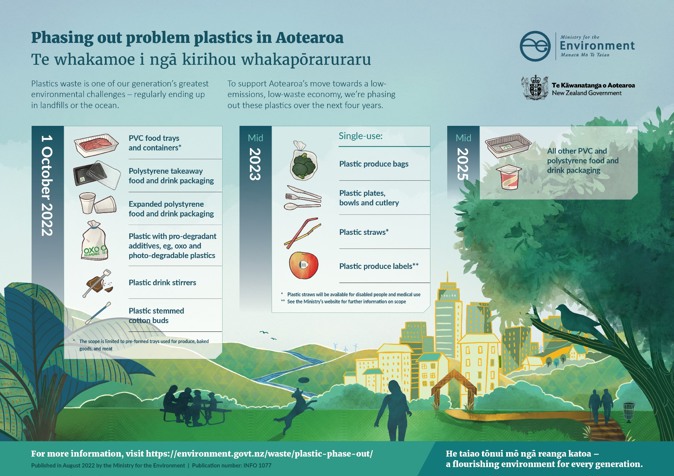What is being banned in October?
From 1 October 2022 it is illegal to provide, sell or manufacture certain hard-to-recycle and single use plastic products in New Zealand. These are:
- Single use plastic drink stirrers
- Single use plastic cotton buds
- Plastics with pro-degradant additives that make them fragment into micro-plastics
- Certain PVC food trays and containers
- Polystyrene takeaway food and beverage packaging
- Expanded polystyrene food and beverage packaging (such as foamy takeaway containers or some instant noodle cups).
More detail on the products banned can be found at Guidance on the 1 October 2022 plastic phase outs
Why are these items being banned?
Plastic is one of our greatest environmental challenges. It regularly ends up as waste in our landfills, moana, and whenua. Plastic is fundamental to today’s world. But when it is overused, not disposed of properly, or escapes into the environment, it can cause significant damage.
Stopping the sale of unnecessary and problematic plastics will reduce waste to landfill, improve our recycling systems and encourage reusable or environmentally responsible alternatives.
As a nation, we embraced the 2019 plastic bag shopping ban – which has meant over 1 billion fewer plastic bags ended up in landfills or the ocean. Following that success, we’re now focused on the phase-out of more problematic plastic items – to remove more than 2 billion items every year.
Has there been any public consultation on plastics bans?
The Government consulted publicly on its plastics phase-out proposals in 2020. This was part of a broader response to the Rethinking Plastics in Aotearoa New Zealand report released by the Prime Minister’s Chief Science Advisor in 2019.
The Ministry for the Environment received close to 8,000 submissions during the consultation. Most were in support of the proposals. There was a good level of response from the general public, affected businesses, environmental and community groups, and local government agencies.
The policy was announced in June 2021 to provide certainty around timing and the plastic products that were to be phased out. Additionally, regulations were published six months ago to meet New Zealand’s international trade obligations and to provide further detail for businesses to adapt and change.
Why are these products being phased out now?
Items that are easier to replace are being phased out sooner than those that are more challenging to replace. This approach strikes a balance between the public feedback for fast action and providing businesses with adequate time to prepare.
Phasing out single use and hard to recycle plastics is part of the Government’s waste reduction work programme. Consultation work in 2020 showed there was broad public support to phase-out these products. Alternatives are readily available to these products and industry has indicated that they are ready for these changes.
This policy is about reducing the harm to our environment from plastics that are difficult to recycle including food and drink packaging made from PVC and polystyrene, plastics that degrade into microplastics in the environment, and single-use items.Phasing out hard-to-recycle plastics will improve our recycling system, reduce confusion and make it easier to recycle in New Zealand.
The Government is focused on moving away from hard-to-recycle plastics and finding innovative solutions where current alternatives are not readily available. Other projects already underway to reduce plastics include regulated product stewardship schemes for plastic packaging, a potential container return scheme, kerbside standardisation, and investment in recycling infrastructure. You can find more information about this work here.
We understand that businesses will need to change their practices to adjust to the new regulations. The Ministry and government encourage voluntary compliance and will use discretion when responding to any breaches of the regulations. In the first instance our preference is to take an educational approach and offer advice to help businesses understand their responsibilities. These phase-outs will help us move away from low-value products that cannot be reused or recycled (and must be sent to landfill at a cost), toward a more circular economy where we use higher-value products that can remain in use.
Will there be any more plastic bans?
Government is phasing out a range of plastics over the next three years.

Further links:
